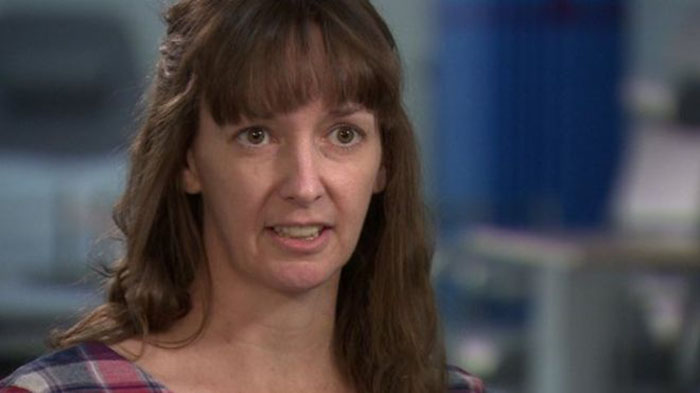It is not thought to be contagious.
The 39-year-old, from Cambuslang, South Lanarkshire, has been flown back the isolation unit at the Royal Free Hospital in London.
Ms Cafferkey spent almost a month in the unit at the beginning of the year after contracting the virus in December 2014.
NHS Greater Glasgow and Clyde said she had been admitted to the Queen Elizabeth University Hospital in Glasgow on Tuesday after feeling unwell and was treated in the infectious diseases unit.
She was transferred from Glasgow to the Royal Free Hospital in the early hours of the morning due to an unusual late complication in her illness.
Dr Emilia Crighton, NHSGGC director of public health, said: "Pauline`s condition is a complication of a previous infection with the Ebola virus.
"The risk to the public is very low. In line with normal procedures in cases such as this, we have identified a small number of close contacts of Pauline`s that we will be following up as a precaution."
Jump media playerMedia player helpOut of media player. Press enter to return or tab to continue.
There is not yet any information about Ms Cafferkey`s condition, but government sources described her transfer to the specialist unit as a "highly precautionary process".
Dr Ben Neuman, a virologist from the University of Reading, told BBC Radio`s Good Morning Scotland programme said the outlook for Ms Cafferkey was good and it was unlikely the virus remained infectious.
He said: "Once the virus is removed from the blood once, it tends to retreat into the hard-to-access components of the body. It`ll hide in places like the back of your eye or breast milk."
He said the effects of the virus on the body could last for up to two years, although it was difficult to know how long it could actually persist.
He added: "The nice news here is that she`s beaten the virus once so she can probably beat it again.
"The odds are that she has actually inherited a lucky set of genes and these are probably what protected her the first time and probably what will keep her safe the second time regardless of any treatment. The outlook`s good."
Ebola is passed on through bodily fluids. It is not transmitted through casual contact.
Last week Ms Cafferkey was in London receiving an award at the Pride of Britain ceremony.
Her award recognised the risks aid workers took with their own health.
There are not thought to be any concerns about contact she had with people at that event but health officials in Scotland are focusing on who she saw since her return home.
Ms Cafferkey spoke to BBC News about the difficulties she had encountered in her recovery.
She had experienced thyroid problems and her hair had fallen out.
Ms Cafferkey contracted Ebola while working as a volunteer with Save the Children at a treatment centre in Kerry Town, in Sierra Leone.
She was diagnosed on 29 December last year, after returning to Glasgow via London.
Her temperature had been tested seven times before she flew from Heathrow to Glasgow and she was cleared to travel, before later falling ill.
She was placed in an isolation unit at Glasgow`s Gartnavel Hospital after becoming feverish, before being transferred by a RAF Hercules plane to London on 30 December.
She was then transferred to the specialist isolation unit at the Royal Free.
After a few days Ms Cafferkey`s condition began to deteriorate, with the hospital announcing she had become critically ill on 4 January.
After leaving hospital in January, Ms Cafferkey said she was "very happy to be alive" and was looking forward to returning to "normal life". She also said she had no plans to return to West Africa.
Asked if she wanted to return to Sierra Leone, she said: "I would have to think seriously about it. I am definitely going to give aid work a break for a while.
"I just want to go back to my normal job, my normal life and I think my family will be happy with that as well."
At the time, Dr Michael Jacobs, from the Royal Free`s infectious diseases team, said Ms Cafferkey had now completely recovered and was "not infectious in any way".
He said Ms Cafferkey was treated with blood plasma from an Ebola survivor and an experimental treatment drug closely related drug to ZMapp, which UK nurse Will Pooley was treated with after he contracted Ebola.
Some survivors of the virus have had eye and joint problems, as well as ongoing fatigue.
The World Health Organisation admits not much is known about the long-term implications after having Ebola.
More about:
















































